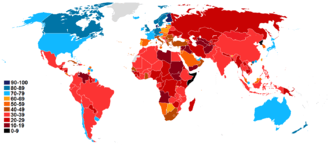Corruption in Egypt
| Political corruption |
|---|
 |
| Concepts |
| Corruption by country |
| Europe |
| Asia |
| Africa |
| North America |
| South America |
| Oceania and the Pacific |
| Transcontinental countries |
Corruption in the Economy
Businesses having more informal connections within the government receive preferable treatment navigating through Egypt's cumbersome regulatory framework, providing a disincentive for competition. An inefficient and sporadically enforced legal system and a widespread culture of corruption leave businesses reliant on the use of middlemen known as wasta, to operate, and well-connected businesses enjoy privileged treatment.[1] Facilitation payments are an established part of 'getting things done', despite irregular payments and gifts being criminalized. Facilitation payments are regarded as bribery in many countries, which prevents many foreign entities from financial involvement with Egypt since they are a required part of doing business. Corruption makes the costs of both local goods as well as imports higher, decreasing the purchasing power of individuals which magnifies poverty.
Attempts at Reform
Prior to the 2011 revolution, critics agreed that corruption in Egypt was widespread and that anti-corruption measures were perceived to be mere cosmetic changes serving Mubarak's political agenda. However, the uprisings spurred a whirlwind of official corruption cases as well as the trials of several ministers and businessmen with ties to the former regime.The government under the Morsi administration claimed to focus its efforts on the fight against corruption and included several anti-corruption initiatives into the new 2012 constitution. The Constitution stipulated, amongst other provisions, the public's right to information, data, documents and statistics. It also imposed annual financial disclosure on Parliament members. Furthermore, the government created an anti-corruption commission designed to deal with standards of integrity and transparency in government and address conflict of interest.[2]
The gap between legislation and enforcement hampers any of the government's efforts in fighting corruption.
References
- ↑ http://www.business-anti-corruption.com/country-profiles/middle-east-north-africa/egypt/snapshot.aspx
- ↑ "What's new in Egypt's draft constitution?". BBC News. Retrieved 7 February 2014.
External links
